"What sound awakened me, I wonder,
For now 'tis dumb."
"Wheels on the road most like, or thunder:
Lie down; 'twas not the drum."
Toil at sea and two in haven
And trouble far;
Fly, crow, away, and follow, raven,
And all that croaks for war.
"Hark, I heard the bugle crying,
And where am I?
My friends are up and dressed and dying,
And I will dress and die."
"Oh love is rare and trouble plenty
And carrion cheap,
And daylight dear at four-and-twenty:
Lie down again and sleep."
"Reach me my belt and leave your prattle:
Your hour is gone;
But my day is the day of battle,
And that comes dawning on.
"They mow the field of man in season:
Farewell, my fair,
And, call it truth or call it treason,
Farewell the vows that were."
"Ay, false heart, forsake me lightly:
'Tis like the brave.
They find no bed to joy in rightly
Before they find the grave.
"Their love is for their own undoing,
And east and west
They scour about the world a-wooing
The bullet to their breast.
"Sail away the ocean over,
Oh sail away,
And lie there with your leaden lover
For ever and a day."
For now 'tis dumb."
"Wheels on the road most like, or thunder:
Lie down; 'twas not the drum."
Toil at sea and two in haven
And trouble far;
Fly, crow, away, and follow, raven,
And all that croaks for war.
"Hark, I heard the bugle crying,
And where am I?
My friends are up and dressed and dying,
And I will dress and die."
"Oh love is rare and trouble plenty
And carrion cheap,
And daylight dear at four-and-twenty:
Lie down again and sleep."
"Reach me my belt and leave your prattle:
Your hour is gone;
But my day is the day of battle,
And that comes dawning on.
"They mow the field of man in season:
Farewell, my fair,
And, call it truth or call it treason,
Farewell the vows that were."
"Ay, false heart, forsake me lightly:
'Tis like the brave.
They find no bed to joy in rightly
Before they find the grave.
"Their love is for their own undoing,
And east and west
They scour about the world a-wooing
The bullet to their breast.
"Sail away the ocean over,
Oh sail away,
And lie there with your leaden lover
For ever and a day."
envoyé par Bartleby - 27/10/2011 - 12:03
×
![]()

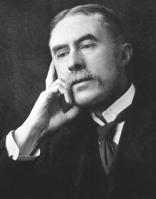

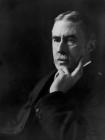
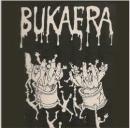
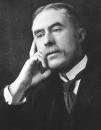

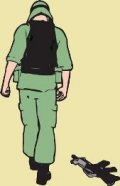
Nella raccolta “Last Poems” pubblicata nel 1922
Una poesia messa in musica da diversi compositori, come Elisabeth Lutyens e Daniel Gregory Mason (The Lied, Art Song, and Choral Texts Archive)
Dialogo tra una donna ed il suo amato che sta per partire in guerra.
Il disertore, il vigliacco, il traditore è qui il coraggioso combattente che diserta, inganna, tradisce l’amore per andare a farsi ammazzare: “Vai, vai pure, cuore traditore, vai oltre oceano con i tuoi coraggiosi compagni, là non avrete un letto pieno d’amore dove giacere ma solo una tomba, là potrete finalmente abbracciare la vostra amata di piombo!”
Housman era un poeta inglese di epoca vittoriana, di formazione classica (un filologo che curò diverse traduzione di lirici latini) e non nascondeva certo la propria ammirazione per il coraggio e per l’Impero e le sue conquiste militari. Ma aveva una sensibilità particolare (era anche un omosessuale dichiarato) ed un pessimismo che si accentuò via via negli anni, in particolare dopo la morte di un fratello nella seconda delle guerre anglo-boere in Sud Africa (1899-1902) e dopo lo strazio del primo conflitto mondiale.